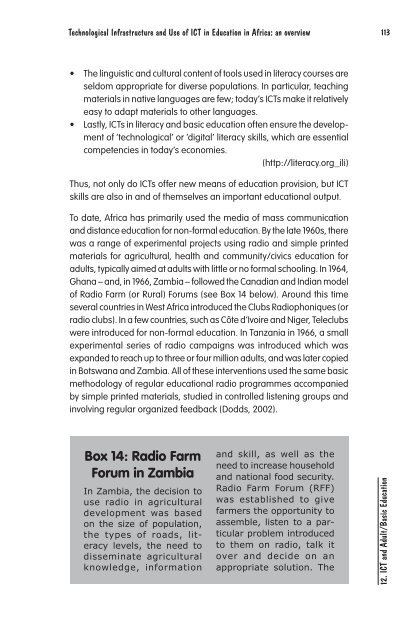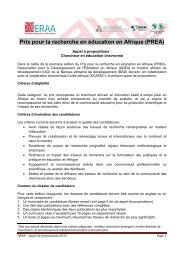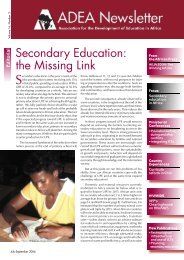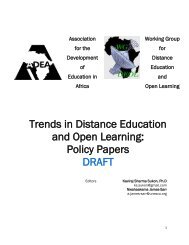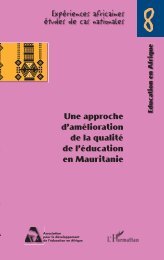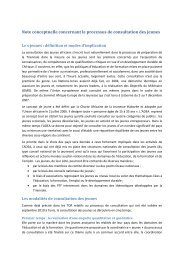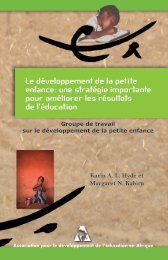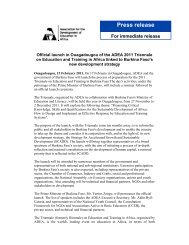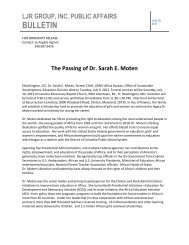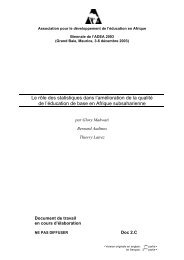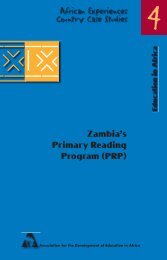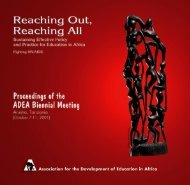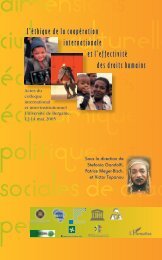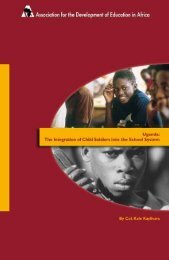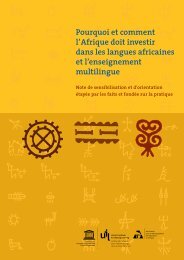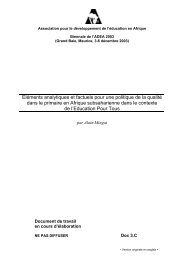Technological Infrastructure and Use of ICT in Education in ... - ADEA
Technological Infrastructure and Use of ICT in Education in ... - ADEA
Technological Infrastructure and Use of ICT in Education in ... - ADEA
You also want an ePaper? Increase the reach of your titles
YUMPU automatically turns print PDFs into web optimized ePapers that Google loves.
<strong>Technological</strong> <strong>Infrastructure</strong> <strong>and</strong> <strong>Use</strong> <strong>of</strong> <strong>ICT</strong> <strong>in</strong> <strong>Education</strong> <strong>in</strong> Africa: an overview<br />
113<br />
• The l<strong>in</strong>guistic <strong>and</strong> cultural content <strong>of</strong> tools used <strong>in</strong> literacy courses are<br />
seldom appropriate for diverse populations. In particular, teach<strong>in</strong>g<br />
materials <strong>in</strong> native languages are few; today’s <strong>ICT</strong>s make it relatively<br />
easy to adapt materials to other languages.<br />
• Lastly, <strong>ICT</strong>s <strong>in</strong> literacy <strong>and</strong> basic education <strong>of</strong>ten ensure the development<br />
<strong>of</strong> ‘technological’ or ‘digital’ literacy skills, which are essential<br />
competencies <strong>in</strong> today’s economies.<br />
(http://literacy.org_ili)<br />
Thus, not only do <strong>ICT</strong>s <strong>of</strong>fer new means <strong>of</strong> education provision, but <strong>ICT</strong><br />
skills are also <strong>in</strong> <strong>and</strong> <strong>of</strong> themselves an important educational output.<br />
To date, Africa has primarily used the media <strong>of</strong> mass communication<br />
<strong>and</strong> distance education for non-formal education. By the late 1960s, there<br />
was a range <strong>of</strong> experimental projects us<strong>in</strong>g radio <strong>and</strong> simple pr<strong>in</strong>ted<br />
materials for agricultural, health <strong>and</strong> community/civics education for<br />
adults, typically aimed at adults with little or no formal school<strong>in</strong>g. In 1964,<br />
Ghana – <strong>and</strong>, <strong>in</strong> 1966, Zambia – followed the Canadian <strong>and</strong> Indian model<br />
<strong>of</strong> Radio Farm (or Rural) Forums (see Box 14 below). Around this time<br />
several countries <strong>in</strong> West Africa <strong>in</strong>troduced the Clubs Radiophoniques (or<br />
radio clubs). In a few countries, such as Côte d’Ivoire <strong>and</strong> Niger, Teleclubs<br />
were <strong>in</strong>troduced for non-formal education. In Tanzania <strong>in</strong> 1966, a small<br />
experimental series <strong>of</strong> radio campaigns was <strong>in</strong>troduced which was<br />
exp<strong>and</strong>ed to reach up to three or four million adults, <strong>and</strong> was later copied<br />
<strong>in</strong> Botswana <strong>and</strong> Zambia. All <strong>of</strong> these <strong>in</strong>terventions used the same basic<br />
methodology <strong>of</strong> regular educational radio programmes accompanied<br />
by simple pr<strong>in</strong>ted materials, studied <strong>in</strong> controlled listen<strong>in</strong>g groups <strong>and</strong><br />
<strong>in</strong>volv<strong>in</strong>g regular organized feedback (Dodds, 2002).<br />
Box 14: Radio Farm<br />
Forum <strong>in</strong> Zambia<br />
In Zambia, the decision to<br />
use radio <strong>in</strong> agricultural<br />
development was based<br />
on the size <strong>of</strong> population,<br />
the types <strong>of</strong> roads, literacy<br />
levels, the need to<br />
dissem<strong>in</strong>ate agricultural<br />
knowledge, <strong>in</strong>formation<br />
<strong>and</strong> skill, as well as the<br />
need to <strong>in</strong>crease household<br />
<strong>and</strong> national food security.<br />
Radio Farm Forum (RFF)<br />
was established to give<br />
farmers the opportunity to<br />
assemble, listen to a particular<br />
problem <strong>in</strong>troduced<br />
to them on radio, talk it<br />
over <strong>and</strong> decide on an<br />
appropriate solution. The<br />
12. <strong>ICT</strong> <strong>and</strong> Adult/Basic <strong>Education</strong>


